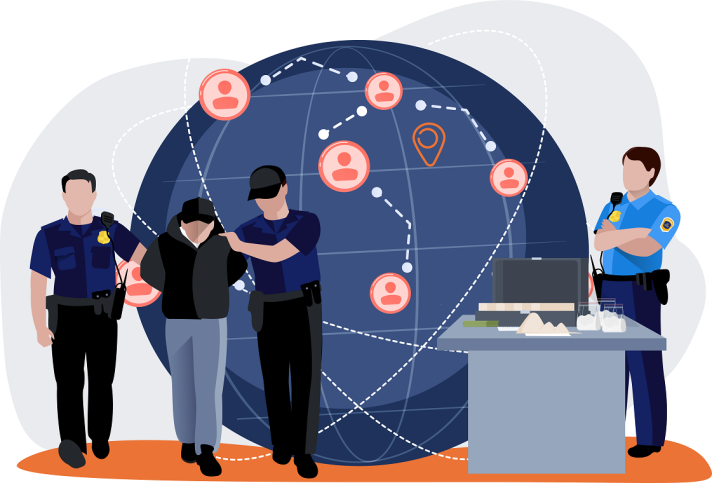On 18 October, the European Commission adopted an EU Roadmap to boost the fight against drug trafficking and organised crime. The drug trade orchestrated by organised crime poses one of the most serious security threats to the EU today. The Roadmap consists of concrete actions that will reinforce the EU’s global response to organised crime and drug trafficking networks.
Drugs: A growing threat to the EU
The drugs trade is one of the most significant security threats faced by the EU today. Seizures of cocaine in the EU are hitting record levels, with 303 tonnes seized in 2021 alone. The activities of criminal networks have evolved in their scale, sophistication, and violent consequences.
It only took two weeks to break the record of 8 tonnes of cocaine seized in Rotterdam, in August 2023, with the seizure of 9.5 tonnes of cocaine in the port of Algeciras, Spain, the same month. This unprecedented increase of illicit drug availability in Europe shows how lucrative the drug trade has become for criminal networks. But it is also a warning of a growing public danger.
Criminals’ global reach and iron grip on drug trafficking supply-chains have led to a wave of violence in the streets across Europe and beyond. As explained by Ylva Johansson, Commissioner for Home Affairs:
“The threat of organised crime and drug trafficking is worsening. It is not only affecting rival gang members, but also innocent people, including children, who find themselves in the crossfire. I have said that we need a network to fight a network. This new Roadmap, which will scale up our response, is a significant step in building that network.”
Between January and September 2023, a 10-year-old boy from Nîmes, an 11-year-old girl from Antwerp, and a 13-year-old boy from Stockholm died because of drug-related violence. Meanwhile, the number of lives lost to drug use is also growing. In 2021 alone, it is estimated that 6,200 people died from drug overdoses in the EU.
Scaling up the response
As the impact of the drug trade is felt throughout communities, economies, and nations, it demands a collective and coordinated response from governments, law enforcement, and private actors in key sectors.
Going beyond traditional repressive measures, the multifaceted response of the new EU Roadmap sets out 17 priority actions in 4 main areas:
- A new European Ports Alliance to increase the resilience of ports against criminal infiltration by reinforcing the work of customs authorities, law enforcement, public and private actors in the ports across the EU. For example, through state-of-the-art scanning and equipment.
- Dismantling high-risk criminal networks through facilitating financial and digital investigations, mapping the biggest criminal networks, reinforcing cooperation between specialised prosecutors and judges, and making use of the Schengen Information System (SIS) alerts.
- Measures to prevent organised crime through exchange of best practices and guidance among Member States to prevent infiltration of these groups in the society and legal economy, prevent criminal groups to recruit youngsters and improve public safety and health, and to limit more effectively access to drug precursors.
- Working with international partners to confront the global threat, including through reinforcing information exchange, joint operations on the main drug trafficking routes, and strengthening law enforcement and judicial cooperation with non-EU countries.
Click here to see the factsheet on the Roadmap
Fighting drug traffickers: an EU priority
The new Roadmap complements the EU Strategy to Tackle Organised Crime 2021-2025 and the EU Drugs Strategy and Action Plan 2021-2025, where extensive policy initiatives and operational actions, as well as international cooperation, are outlined.
The EU Strategy to Tackle Organised Crime sets out the EU’s collective efforts in the fight against criminal networks, by boosting law enforcement and judicial cooperation, tackling organised crime structures and high priority crimes, removing criminal profits and ensuring a modern response to technological developments. The Drugs Strategy and Action Plan takes an evidence-based, integrated, balanced and multidisciplinary approach to the drugs phenomenon at national, EU and international level. It also incorporates a gender equality and health equity perspective. It is structured around three policy areas, each corresponding to a strategic priority: drug supply reduction, drug demand reduction, and addressing drug-related harm.
Find out more on what the European Commission is doing to fight drug trafficking and organised crime.
Details
- Publication date
- 18 October 2023
- Author
- Directorate-General for Migration and Home Affairs


